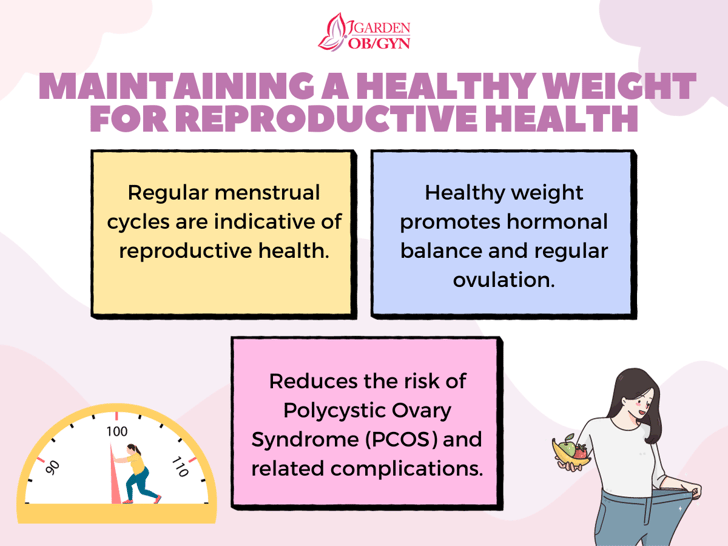Link Between Weight and Reproductive Health
Explore the vital connection between a healthy weight and reproductive health. From menstrual regularity to sperm quality, discover how lifestyle choices impact fertility for both men and women. Learn why maintaining balance is key to a thriving reproductive future.

In recent years, there has been a growing awareness of the intricate relationship between body weight and reproductive health. While the importance of a healthy weight for overall well-being is widely recognized, its specific impact on fertility and reproductive health is an area that demands attention. Achieving and maintaining a healthy weight is not just about aesthetics; it plays a pivotal role in optimizing reproductive function in both men and women.
Body Weight and Female Fertility:
-
Menstrual Regularity: One of the key indicators of reproductive health in women is the regularity of the menstrual cycle. Irregular menstrual cycles can be associated with hormonal imbalances, which may interfere with ovulation and fertility. Maintaining a healthy weight contributes to hormonal balance, promoting regular menstrual cycles and optimizing the chances of conception.
-
Ovulation and Conception: For women, the process of ovulation is essential for conception. Both underweight and overweight conditions can disrupt this process. Underweight women may experience irregular ovulation or even the absence of ovulation, while overweight women may face challenges due to hormonal imbalances. Striking a balance in body weight enhances the likelihood of regular ovulation and successful conception.
-
Risk of Polycystic Ovary Syndrome (PCOS): Obesity is closely linked to the development of Polycystic Ovary Syndrome (PCOS), a common reproductive disorder affecting women of childbearing age. PCOS can lead to irregular ovulation, insulin resistance, and other fertility-related complications. Maintaining a healthy weight reduces the risk of developing PCOS and mitigates its impact on reproductive health.
Body Weight and Male Fertility:
-
Sperm Quality: Male fertility is not immune to the effects of body weight. Studies have shown that overweight and obese men may experience a decline in sperm quality, including reduced sperm count and motility. Achieving and maintaining a healthy weight positively influences sperm production and function, thereby enhancing fertility.
-
Hormonal Balance: Obesity is associated with hormonal imbalances in men, particularly elevated estrogen levels and reduced testosterone levels. These hormonal shifts can negatively affect sperm production and function. By adopting a healthy lifestyle and maintaining an optimal weight, men can contribute to the maintenance of hormonal balance and support reproductive health.
The Importance of Lifestyle Factors:
-
Nutrition: A well-balanced diet is a cornerstone of maintaining a healthy weight and supporting reproductive health. Adequate intake of essential nutrients, vitamins, and minerals is crucial for the proper functioning of reproductive organs and hormonal regulation.
-
Physical Activity: Regular physical activity not only aids in weight management but also promotes overall well-being. Exercise has been shown to positively impact fertility by reducing stress, improving hormonal balance, and enhancing blood flow to reproductive organs.
-
Stress Management: Chronic stress can disrupt hormonal balance and negatively impact reproductive health in both men and women. Incorporating stress-reducing activities such as mindfulness, meditation, and relaxation techniques can contribute to a healthier reproductive system.
Conclusion:
In conclusion, maintaining a healthy weight is paramount for optimizing fertility and overall reproductive health. Both men and women play a crucial role in this process, and adopting a lifestyle that includes a balanced diet, regular exercise, and stress management is essential. Recognizing the interconnectedness of body weight and reproductive health empowers individuals to make informed choices that positively influence their chances of conception and contribute to a healthier future for the next generation.
































